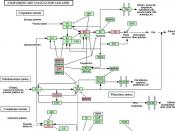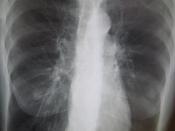I. The effects of second-hand smoke on adults.
Smoking cigarettes causes lung cancer. Harmful substances (carcinogens), found in tobacco, damage cells in the lungs. Over time, the damaged cells may become cancerous. The likelihood that a smoker will develop lung cancer is affected by the age at the person began smoking, how long the person has smoked, the number of cigarettes smoked per day, and how deeply the smoker inhales. Stopping smoking greatly reduces a person's risk for developing lung cancer.
The study, published in the March 25, 1999 'New England Journal of Medicine', was authored by Jiang He of the Tulane University School of Public Health found that greater exposure to second-hand smoke increased the risk of heart disease. The risk increase was 23% greater for people exposed to the smoke of one to 19 cigarettes per day, and 31% greater for people exposed to more than 20 cigarettes per day.
Smokers have a 60 to 70% greater risk of heart disease compared to nonsmokers. Second hand smoke not only damages the body, it may even cause life-threatening diseases such as lung cancer. Plus, nonsmokers who are exposed to environment tobacco smoke (ETS) have a 30% increased risk of dying from heart disease.
One other effect of second hand smoke is Emphysema. Emphysema is a condition in which the walls between the alveoli or air sacs within the lung lose their ability to stretch and recoil. The air sacs become weakened and break. Elasticity of the lung tissue is lost, causing air to be trapped in the air sacs and impairing the exchange of oxygen and carbon dioxide. Also, the support of the airways is lost, allowing for airflow obstruction. Symptoms of emphysema include shortness of breath, cough and a limited exercise tolerance. Emphysema and chronic bronchitis frequently co-exist...


